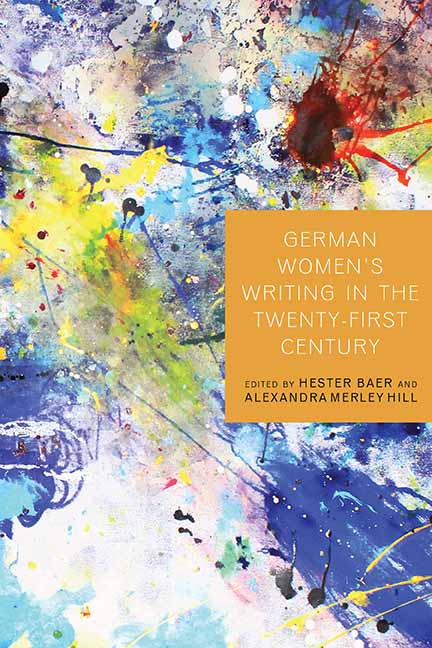Book contents
- Frontmatter
- Dedication
- Contents
- Acknowledgments
- Introduction: German Women’s Writing Beyond the Gender Binary
- 1 Language-Bodies: Interpellation and Gender Transition in Antje Rávic Strubel’s Kältere Schichten der Luft and Judith Hermann’s “Sonja”
- 2 Matrilineal Narrative and the Feminist Family Romance
- 3 The Pitfalls of Constructing a Female Genealogy: Cultural Memory of National Socialism in Recent Family Narratives
- 4 Reckoning with God: Attitudes toward Religion in German-Language Women’s Writing in the Twenty-First Century
- 5 Muslim Writing, Women’s Writing
- 6 Popfeminism, Ethnicity, and Race in Contemporary Germany: Hatice Akyün’s Popfeminist Autobiographic Works Einmal Hans mit scharfer Soße (2005) and Ali zum Dessert (2008)
- 7 The Awkward Politics of Popfeminist Literary Events: Helene Hegemann, Charlotte Roche, and Lady Bitch Ray
- 8 The Indictment of Neoliberalism and Communism in the Novels of Katharina Hacker, Nikola Richter, Judith Schalansky, and Julia Schoch
- 9 Sounds of Silence: Rape and Representation in Juli Zeh’s Bosnian Travelogue
- Bibliography
- Notes on the Contributors
- Index
9 - Sounds of Silence: Rape and Representation in Juli Zeh’s Bosnian Travelogue
Published online by Cambridge University Press: 25 May 2021
- Frontmatter
- Dedication
- Contents
- Acknowledgments
- Introduction: German Women’s Writing Beyond the Gender Binary
- 1 Language-Bodies: Interpellation and Gender Transition in Antje Rávic Strubel’s Kältere Schichten der Luft and Judith Hermann’s “Sonja”
- 2 Matrilineal Narrative and the Feminist Family Romance
- 3 The Pitfalls of Constructing a Female Genealogy: Cultural Memory of National Socialism in Recent Family Narratives
- 4 Reckoning with God: Attitudes toward Religion in German-Language Women’s Writing in the Twenty-First Century
- 5 Muslim Writing, Women’s Writing
- 6 Popfeminism, Ethnicity, and Race in Contemporary Germany: Hatice Akyün’s Popfeminist Autobiographic Works Einmal Hans mit scharfer Soße (2005) and Ali zum Dessert (2008)
- 7 The Awkward Politics of Popfeminist Literary Events: Helene Hegemann, Charlotte Roche, and Lady Bitch Ray
- 8 The Indictment of Neoliberalism and Communism in the Novels of Katharina Hacker, Nikola Richter, Judith Schalansky, and Julia Schoch
- 9 Sounds of Silence: Rape and Representation in Juli Zeh’s Bosnian Travelogue
- Bibliography
- Notes on the Contributors
- Index
Summary
Same River, Different Sides
ON A SWELTERING SUMMER DAY in 2001, the writer Juli Zeh stood on the banks of the river Drina in Bosnia-Herzegovina, not far from the town of Srebrenica, where, in the summer of 1995, Serbian forces killed 8,000 Bosnian Muslims in plain view of United Nations peacekeeping forces. The Drina does not flow through Srebrenica, but it does flow through Višegrad, one of the first sites of the brutal expulsion of Muslims from northeastern Bosnia. As Zeh struggled to clear her mind of images of bloody corpses floating in the Drina near Višegrad, she turned her thoughts to another German-language writer who journeyed to former Yugoslavia: Peter Handke. Zeh writes:
Da drüben auf der anderen Seite stand Peter Handke vor fünfdreiviertel Jahren, entdeckte eine schwimmende Kindersandale und wollte nicht herüberkommen. Was haben sie ihn dafür gescholten.
[Five and three-quarter years ago, Peter Handke stood over there on the other side, discovered a child's floating sandal, and didn't want to come over to this side. How they scolded him for that.]
This brief episode comes from Zeh's Bosnian travelogue Die Stille ist ein Geräusch (Even Silence Is a Sound, 2002), a literary rendition of the travel diary the author kept while on a five-week trip through Bosnia in 2001. With only her dog Othello as her constant companion, Zeh journeyed through various Bosnian towns and cities, taking in the landscape still marred by war and littered with landmines, and interacting with locals, with Western journalists, and with members of international peacekeeping forces. The text has a complex narrative structure; Zeh interweaves the first-person account of her trip through Bosnia with geopolitical references to the conflict in Yugoslavia and with cultural references, both implicit and explicit, to literary works by Hans Magnus Enzensberger and Joseph Conrad, contemporary films, and even the beloved Asterix comics. The passage on Handke itself is multilayered, pointing first to a particular moment in Handke's own account of his 1995 journey to Serbia, Eine winterliche Reise zu den Flüssen Donau, Save, Morawa und Drina oder Gerechtigkeit für Serbien (A Winter Journey to the Rivers Danube, Save, Morawa, and Drina, or Justice for Serbia, 1996; published in English as A Journey to the Rivers: Justice for Serbia, 1997), and then to the controversy that immediately followed its publication in the Süddeutsche Zeitung.
- Type
- Chapter
- Information
- German Women's Writing in the Twenty-First Century , pp. 175 - 196Publisher: Boydell & BrewerPrint publication year: 2015
- 10
- Cited by

